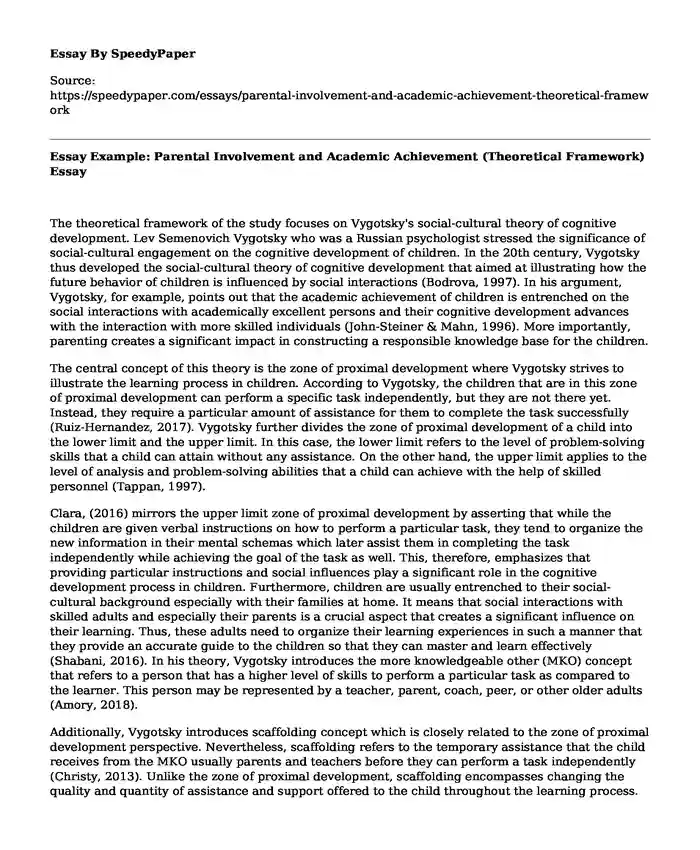The theoretical framework of the study focuses on Vygotsky's social-cultural theory of cognitive development. Lev Semenovich Vygotsky who was a Russian psychologist stressed the significance of social-cultural engagement on the cognitive development of children. In the 20th century, Vygotsky thus developed the social-cultural theory of cognitive development that aimed at illustrating how the future behavior of children is influenced by social interactions (Bodrova, 1997). In his argument, Vygotsky, for example, points out that the academic achievement of children is entrenched on the social interactions with academically excellent persons and their cognitive development advances with the interaction with more skilled individuals (John-Steiner & Mahn, 1996). More importantly, parenting creates a significant impact in constructing a responsible knowledge base for the children.
The central concept of this theory is the zone of proximal development where Vygotsky strives to illustrate the learning process in children. According to Vygotsky, the children that are in this zone of proximal development can perform a specific task independently, but they are not there yet. Instead, they require a particular amount of assistance for them to complete the task successfully (Ruiz-Hernandez, 2017). Vygotsky further divides the zone of proximal development of a child into the lower limit and the upper limit. In this case, the lower limit refers to the level of problem-solving skills that a child can attain without any assistance. On the other hand, the upper limit applies to the level of analysis and problem-solving abilities that a child can achieve with the help of skilled personnel (Tappan, 1997).
Clara, (2016) mirrors the upper limit zone of proximal development by asserting that while the children are given verbal instructions on how to perform a particular task, they tend to organize the new information in their mental schemas which later assist them in completing the task independently while achieving the goal of the task as well. This, therefore, emphasizes that providing particular instructions and social influences play a significant role in the cognitive development process in children. Furthermore, children are usually entrenched to their social-cultural background especially with their families at home. It means that social interactions with skilled adults and especially their parents is a crucial aspect that creates a significant influence on their learning. Thus, these adults need to organize their learning experiences in such a manner that they provide an accurate guide to the children so that they can master and learn effectively (Shabani, 2016). In his theory, Vygotsky introduces the more knowledgeable other (MKO) concept that refers to a person that has a higher level of skills to perform a particular task as compared to the learner. This person may be represented by a teacher, parent, coach, peer, or other older adults (Amory, 2018).
Additionally, Vygotsky introduces scaffolding concept which is closely related to the zone of proximal development perspective. Nevertheless, scaffolding refers to the temporary assistance that the child receives from the MKO usually parents and teachers before they can perform a task independently (Christy, 2013). Unlike the zone of proximal development, scaffolding encompasses changing the quality and quantity of assistance and support offered to the child throughout the learning process. The MKO adjusts the level of support depending on the child's level of performance. In this case, it means that as the child becomes more familiar with the task and as he/she becomes more skilled to complete the task, the MKO then provides less and less guidance. Therefore, the children that tend to experience difficulties in performing a particular task require greater assistance and guidance from the MKO until they learn to complete the task independently where the scaffolds are no longer required.
References
Amory, M. (2018). L.S. Vygotsky and Education by L. C. Moll (2014). Language And Sociocultural Theory, 5(1), 80-84. doi: 10.1558/lst.33128
Bodrova, E. (1997). Key concepts of vygotsky's theory of learning and development. Journal Of Early Childhood Teacher Education, 18(2), 16-22. doi: 10.1080/1090102970180205
Christy, T. (2013). Vygotsky, cognitive development and language: New perspectives on the nature of grammaticalization. Historiographia Linguistica International Journal For The History Of The Language Sciences, 40(1-2), 199-227. doi: 10.1075/hl.40.1-2.07chr
Clara, M. (2016). How Instruction Influences Conceptual Development: Vygotsky's Theory Revisited. Educational Psychologist, 52(1), 50-62. doi: 10.1080/00461520.2016.1221765
John-Steiner, V., & Mahn, H. (1996). Sociocultural approaches to learning and development: A Vygotskian framework. Educational Psychologist, 31(3-4), 191-206. doi: 10.1080/00461520.1996.9653266
Ruiz-Hernandez, C. (2017). Towards an experimental verification of vygotsky's zone of proximal development: A docimological approach. Education Journal, 6(1), 47. doi: 10.11648/j.edu.20170601.16
Shabani, K. (2016). Applications of Vygotsky's sociocultural approach for teachers' professional development. Cogent Education, 3(1). doi: 10.1080/2331186x.2016.1252177
Tappan, M. B. (1997). Language, culture, and moral development: A Vygotskian Perspective. Developmental Review, 17(1), 78-100. doi: 10.1006/drev.1996.0422
Cite this page
Essay Example: Parental Involvement and Academic Achievement (Theoretical Framework). (2022, Nov 07). Retrieved from https://speedypaper.com/essays/parental-involvement-and-academic-achievement-theoretical-framework
Request Removal
If you are the original author of this essay and no longer wish to have it published on the SpeedyPaper website, please click below to request its removal:
- King Arthur Review in Our Free Essay Example
- Free Essay: Contrast Between Angela Whitiker's and Mr. Peralta's Ways to Success
- Theology Essay Sample
- State vs. Human Security, Free Essay from Our Database
- Essay Sample: Bank of America Versus Sundquist
- Business Strategy Development, Free Essay for You
- Essay Sample on Grievance and Disciplinary Procedures
Popular categories





